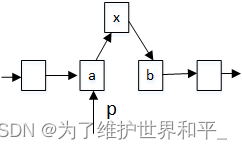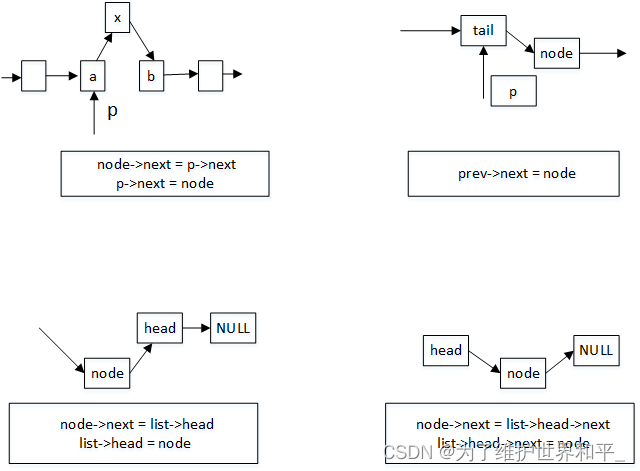目录
链表
链表,一种提高数据读取性能的技术,在硬件设计、软件开发中有广泛应用。常见CPU缓存,数据库缓存,浏览器缓存等。缓存满时,采用相应的策略清除一部分缓存。如FIFO,LFU(Least Frequently Used),LRU(Least Recently Used)
链表类型
单链表,双链表,循环链表
链表插入

x->next = p->next;
p->next = x;链表删除
删除p节点的后继节点
p->next = p->next->next;删除链表的最后一个节点
if(head->next == NULL)
head = NULL;写程序注意点
链表尾空,代码能否工作
链表只有一个节点,
链表包含两个节点?
链表头尾节点处理
与数组区别
数组需要连续的存储空间;链表不需要连续的存储
数组与链表的对比,并不能局限于时间复杂度。
数组简单易用,在实现上使用连续的内存空间,借助于CPU的缓存机制,预读数组中的数据,访问效率更高。而链表在内存中并不是连续存储,没法预读。
数组缺点,系统没有足够的连续空间,导致内存不足。数组申请时大小固定,如果不够用,不支持动态扩容。
如果代码对内存使用苛刻,使用数组。因为链表节点占用空间。而且链表的删除,插入导致内存申请和释放,容易造成内存碎片。
链表应用
LRU 实现思想
维护一个链表,越靠近尾部节点,是越早之前访问。有新数据访问时,从链表头开始顺序遍历链表。
- 如果数据已经被缓存到链表中,遍历链表,将其从原来位置删除,插入到链表头。
- 如果不在缓存中,缓存未满,直接将此节点插入到链表的头部
- 如果缓存满,,将链表尾节点删除,将新的节点插入链表的头部
list.h
typedef struct listNode
{
struct listNode *next;
void *value;
}listNode;
typedef struct linkedList
{
listNode *head;
size_t len;
}linkedList;
list.c
#include<string.h>
#include"list.h"
#include<stdio.h>
linkedList *listCreate()
{
struct linkedList *list = NULL;
list = malloc(sizeof(*list));
if(list == NULL)
{
return NULL;
}
list->head = NULL;
list->len = 0;
printf("list->head = %x\n",list->head);
return list;
}
void listRelease(linkedList *list)
{
if(NULL == list)
return;
free(list);
list = NULL;
}
linkedList *listAddNodeHead(linkedList *list,int value)
{
if(NULL == list || NULL==value)
{
return list;
}
listNode *node = NULL;
node = malloc(sizeof(*node));
if(node == NULL)
return list;
node->value = value;
printf("head value = %x \n",list->head);
// head
// node->next
node->next = list->head;
list->head = node;
list->len++;
return list;
}
linkedList *listAddNodeTail(linkedList *list ,int value)
{
if(NULL == list || NULL==value)
{
return list;
}
listNode *node = NULL;
node = malloc(sizeof(*node));
if(node == NULL)
return list;
node->value = value;
node->next = NULL;
if(NULL == list->head)
list->head = node;
else
{
listNode *tail = list->head;
listNode *pre = list->head;
while(NULL != tail)
{
pre = tail;
tail = tail->next;
}
pre->next = node;
}
list->len++;
return list;
}
void dump(linkedList *list)
{
if(list == NULL)
return;
linkedList *listAll = list;
listNode *node= listAll->head;
while(node)
{
printf("data =%d\n",node->value);
node = node->next;
}
}
linkedList * listAddMiddle(linkedList *L,int index,int value)
{
if(NULL == L || NULL==value)
{
return NULL;
}
listNode *node = NULL;
node = malloc(sizeof(*node));
if(node == NULL)
return NULL;
node->value = value;
node->next = NULL;
listNode *p = L->head;
if(p == NULL)
{
printf("header null\n");
return NULL;
}
if(index > L->len)
{
printf("index over len\n");
return NULL;
}
printf("value=%d\n",p->value);
int i=0;
while(i<index && p!= NULL)
{
i++;
p = p->next;
printf("seek\n");
}
node->next = p->next;
p->next = node;
}
int main()
{
struct linkedList *head = NULL;
head = listCreate();
if(head == NULL){
printf("list create error\n");
return -1;
}
else
listAddNodeHead(head,6);
listAddNodeHead(head,5);
listAddNodeHead(head,4);
listAddNodeHead(head,3);
listAddNodeHead(head,2);
listAddNodeHead(head,1);
listAddMiddle(head,0,10);
//listAddMiddle(head,4,11);
dump(head);
listAddNodeTail(head,11);
listAddNodeTail(head,22);
dump(head);
}
